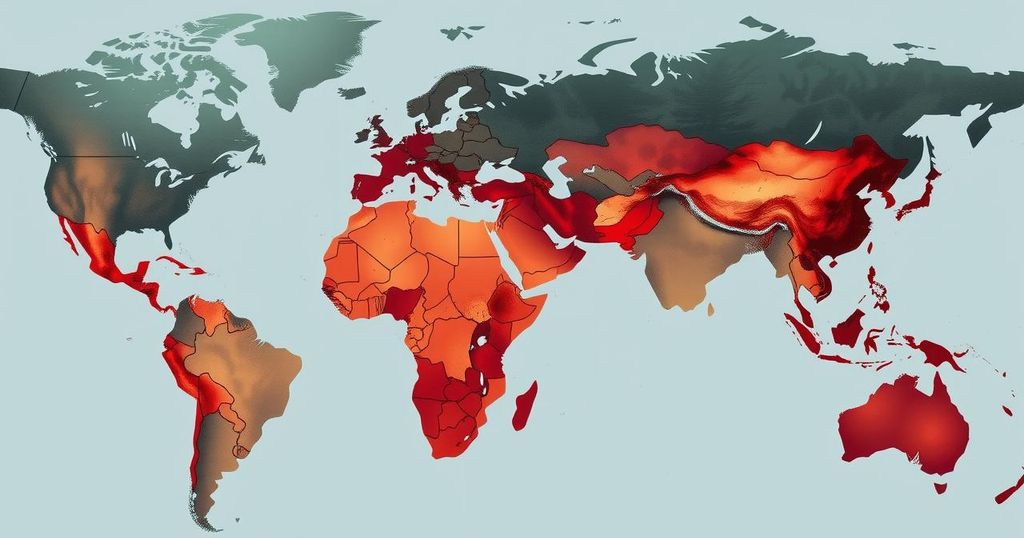Escalating Humanitarian Crises: Gaza, Haiti, DR Congo, and Sudan

The humanitarian crises in Gaza, Haiti, the Democratic Republic of the Congo, and Sudan are worsening. In Gaza, ongoing violence has forced mass displacements and critical shortages in supplies. Haiti faces a cholera outbreak amidst insecurity. Violence in the Democratic Republic of the Congo disrupts aid delivery, while evolving conditions in Sudan’s Zamzam camp pose serious risks to displaced populations. International organizations emphasize the need for urgent humanitarian assistance and protection for civilians.
Occupied Palestinian Territory
The humanitarian crisis in Gaza continues to escalate, with the United Nations Office for the Coordination of Humanitarian Affairs (OCHA) reporting that attacks have persisted for three consecutive days, resulting in numerous fatalities and injuries. The UN Relief and Works Agency for Palestine Refugees (UNRWA) has confirmed that another five staff members have died, raising the agency’s death toll since 7 October 2023 to 284.
Mass displacement is rampant, with over 68,000 individuals having fled since evacuation orders were issued. An evacuation order specifically for Khan Younis regions was enacted today due to ongoing hostilities. The Under-Secretary-General for Humanitarian Affairs, Tom Fletcher, has highlighted that families in Gaza are compelled to evacuate amidst fears of continued bombardment.
Fletcher condemned an attack that resulted in the death of a UN staff member within a designated compound, emphasizing that civilians and humanitarian workers must not be targeted under international law. He reiterated the urgent need to lift the blockade on vital humanitarian aid and called for enhanced international scrutiny and accountability for these actions.
The humanitarian crisis is exacerbated by dwindling supplies of essential resources. The UN Population Fund (UNFPA) reported alarming shortages of maternal health medicines, jeopardizing the health of pregnant women. Gaza’s healthcare facilities are overwhelmed, with hospitals running low on blood supplies and resources necessary for trauma care, despite previous ceasefire support.
In response to the dire circumstances, humanitarian organizations continue to provide essential services such as water trucking and medical aid wherever feasible, amidst significant operational challenges due to security concerns. OCHA maintains that the delivery of humanitarian assistance must be prioritized and that civilians deserve protection.
Haiti
The cholera situation in Haiti is becoming increasingly precarious, with over 900 suspected cases reported since the beginning of the year. Severe insecurity, particularly in Port-au-Prince’s Cité Soleil, hampers response measures, jeopardizing containment efforts. The Ministry of Health, alongside the World Health Organization (WHO), is mobilizing medicines and supplies to vulnerable areas.
OCHA has expressed concern over chronic underfunding for humanitarian initiatives which severely limits the response to the crisis, as only $3.6 million of the needed $87 million has been raised. This deficit impacts critical water, sanitation, and hygiene services, putting millions at risk amidst growing violence and health needs.
Democratic Republic of the Congo
Surging violence in Ituri province has put thousands of civilians at risk, with armed groups launching assaults on areas housing displaced persons. OCHA reports heightened tension in Djugu territory leading to the suspension of activities by several humanitarian organizations, affecting around 300,000 people’s access to essential support.
Clashes continue to displace individuals in North and South Kivu provinces, with over 10,000 fleeing from ongoing violence. The humanitarian community is facing increasing challenges in providing relief due to the intensifying hostilities and lack of access due to security threats.
Sudan
Conditions at the Zamzam displacement camp in North Darfur have significantly deteriorated, with armed groups cutting off supply routes to El Fasher. The blockade has severely affected access to essential resources, particularly water. Residents face extreme difficulties, waiting up to two days to fill a water container as humanitarian efforts are hindered by fuel shortages and security concerns.
While some basic nutrition services continue, the closure of key medical facilities endangers the well-being of severely malnourished children within the camp. Recent discussions with local authorities indicate potential openings for aid routes, yet the immediate need for de-escalation of hostilities remains critical to facilitate humanitarian access.
OCHA reiterates the necessity for all parties to comply with international humanitarian law to ensure civilian protection and prompt delivery of aid.
In summary, the humanitarian situations across the Occupied Palestinian Territory, Haiti, the Democratic Republic of the Congo, and Sudan are deteriorating significantly. Each region faces unique challenges, from escalating violence leading to fatal attacks and displacements to severe shortages of medical supplies and essential services. International agencies, including OCHA, stress the urgency of providing humanitarian assistance and the imperative for the protection of civilians in conflict zones. Continued commitment and support from the global community are crucial to alleviate these crises and adhere to humanitarian law.
Original Source: www.unocha.org








